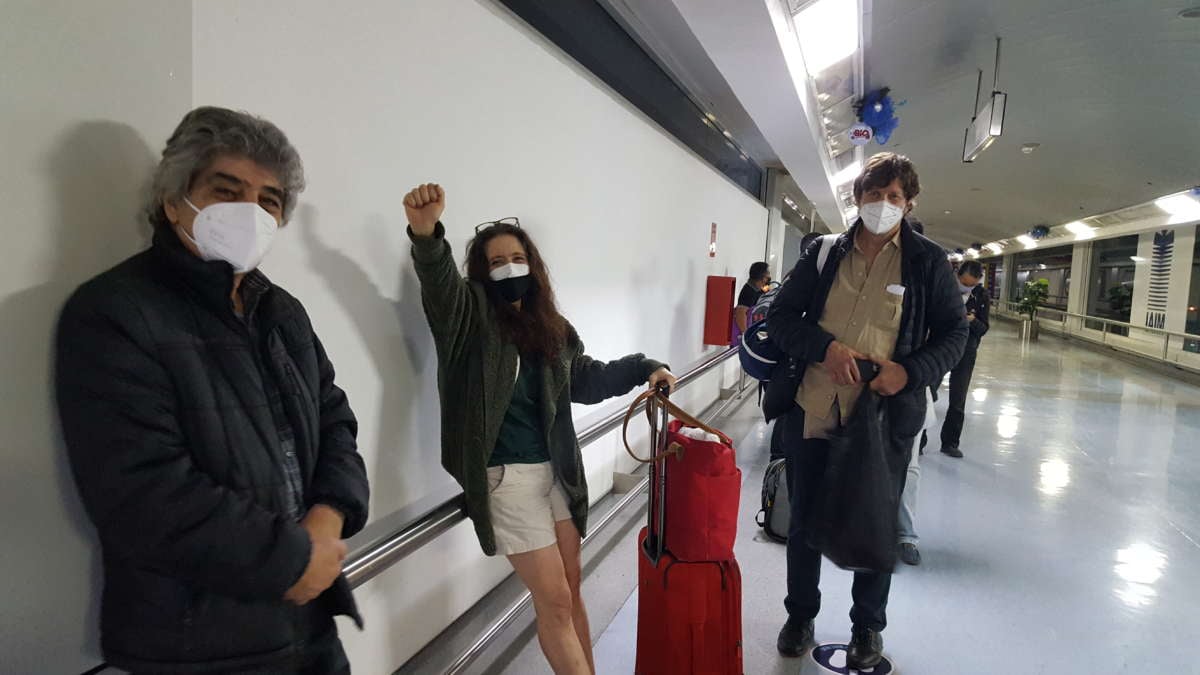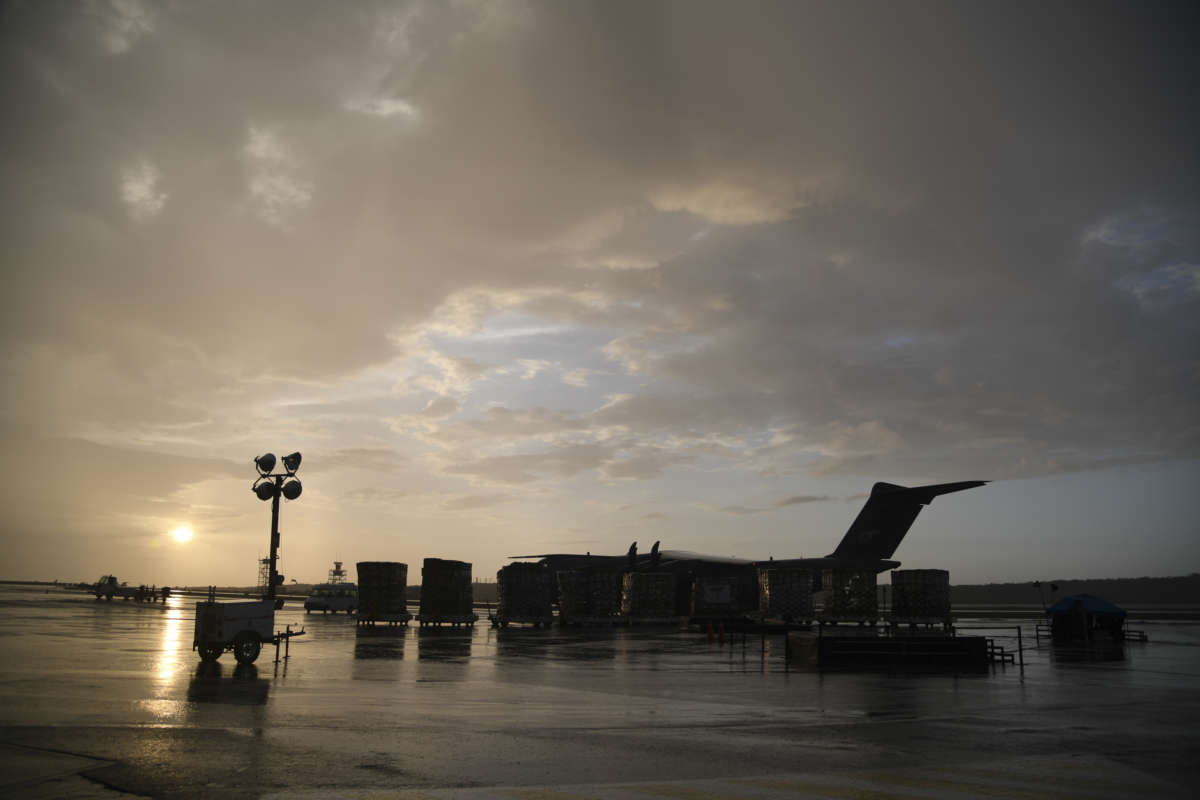Did you know that Truthout is a nonprofit and independently funded by readers like you? If you value what we do, please support our work with a donation.
I recently traveled to Venezuela to be an observer for its National Assembly election and was struck by a stark difference between the ways Venezuela and the United States are handling the COVID-19 pandemic.
My experience at the airport in Caracas, Venezuela, gave me a taste of what a coordinated public health approach looks like in practice, compared to the disjointed politicized approach in the United States. Airports in the United States are currently serving as uncontrolled portals of disease spread. Venezuela demonstrates it doesn’t have to be this way and that mitigating the spread of infection can be done in an empowering and compassionate way, rather than an oppressive way.
Despite the economic war being waged against Venezuela by the United States that has caused a fuel crisis and serious shortages of medications and basic medical supplies, Venezuela is handling the pandemic better than all the other countries in South America except Guyana, which has comparable numbers of cases and deaths per million residents. Brazil, Argentina, Colombia and Peru have 7 to 9 times as many cases and 23 to 33 times as many deaths as Venezuela. The difference between the United States and Venezuela is even more disparate — the United States has almost 14 times as many cases and 28 times the deaths.
My travels provided a window into the widespread availability of protective equipment and sanitizing supplies in Venezuela. Flight attendants wearing disposable coveralls over their uniforms handed out packets of masks and hand sanitizer as people boarded the airplane. Similar packets were found in the hotel rooms. People were sprayed with sanitizing mist and had their temperature checked before entering hotels. As election observers, we were also given a packet of N95 masks, eye protection and sanitizing spray on arrival in Caracas.
At the airport in Caracas, passengers were checked as soon as they left the airplane. Stickers on the ground indicated where to stand in line to maintain physical distancing. Posters of a cute character demonstrating how to stop the spread of infection were posted throughout the airport. Temperatures were taken and travelers passed through a sanitizing mist into an area staffed by health professionals where they were screened. If someone did not have proof of a recent negative COVID-19 PCR test or if there were concerns, a free test was given. This took place before entering immigration. On departure, a similar screening was performed before entering the airport.

Contrast this with my travel in the United States, where no such screening was done. Going through security was just as crowded as before the pandemic, and travelers did not respect physical distancing. The bottle of hand sanitizer spray given to me in Caracas was confiscated by an agent upon my return to the United States because it was more than three ounces.
The security area in the Miami airport was particularly congested. A Transportation Security Agency (TSA) supervisor there explained they did not have the staff or authority to encourage passengers to follow distancing guidelines. Due to COVID-19, 195 TSA agents were out on leave. The supervisor shared that only the county government has the authority to enforce public health measures and it is refusing to do so. In exasperation, he said that when TSA agents asked travelers to take precautions, they were sometimes yelled at and told the virus is a hoax.
It is no surprise this is happening in Florida. Gov. Ron DeSantis has thwarted local efforts to control the spread of COVID-19. CNN interviewed public health officers in Florida and found they feared losing their jobs if they informed people about or enforced public health guidelines. The governor has actively blocked local governments from instating mask mandates or closing nonessential businesses. He even did public events with Scott Atlas, a former adviser to President Trump who has been pushing a hands-off approach of letting the virus spread.
As a result, Miami-Dade County “has the highest per capita rate of confirmed coronavirus cases of any of the 50 most populous counties in the U.S.,” according to CNN. When it comes to infectious agents, what happens in Miami doesn’t stay there. Without appropriate screening, the virus can freely travel throughout the United States and beyond. Recall what happened when college students traveled to Florida for spring break this year and brought the virus back to their communities. One study found that in the period three to five weeks after their return, deaths from COVID-19 increased.
Miami isn’t the only problem. The U.S.’s lack of travel-related public health precautions is worsening the pandemic. This is demonstrated by the increase in cases following Thanksgiving when airplane travel was at its highest since the pandemic began. Prior to the holiday, the number of new cases each day was declining, but within a week, that number surpassed the peak of the fall surge and continues to rise. The number of deaths each day is also rising.
Mitigating the spread of COVID-19 through travel cannot be left up to local authorities alone. It requires a national strategy, and that’s where the Centers for Disease Control and Prevention (CDC) ought to come in. Although the CDC warned people to stay home over Thanksgiving, nearly 10 million of them traveled by plane. Obviously, more is needed. If people are going to fly, then actions must be taken to protect them.
During our conversation, the TSA supervisor in Miami asked why the CDC wasn’t there screening people. The CDC has the authority to set up mechanisms that promote physical distancing. It can screen people before they travel and upon arrival, as Venezuela does. It can provide information about how to protect themselves from infection and give out N95 masks and hand sanitizer. These measures must be included in public demands for stronger COVID-19 protections.
In Venezuela, free COVID-19 PCR tests were also offered at the hotels. Health professionals were available to assist as needed. One person from Puerto Rico who was part of an election observer delegation, Monisha Rios, tested positive while she was in Caracas. Truthout spoke to her about the experience.
Rios spoke highly about her care in Caracas, where she continues to quarantine. She was informed of her positive result discretely and reassured that she could stay in her hotel room as long as was necessary with meals provided through room service. A health team was in frequent communication with her and when her health status became concerning, she was transported to the COVID-19 unit of the local hospital by ambulance for observation and treatment.
Despite the U.S.-imposed economic blockade that has caused shortages of some medicines, Rios described the care at the hospital as “tremendous” and said she felt lucky this happened in Venezuela, where there is socialized medicine, rather than in Puerto Rico, where she does not have health insurance. She was particularly grateful for the integration of complementary and allopathic medicine at the hospital, where she stayed for six days. She said the care she received also showed a genuine concern for her mental well-being and she was “treated as a human being with compassion, respect and dignity.”
Of course, the health care system in Venezuela does face challenges. The economic blockade has not only decimated Venezuela’s once-thriving pharmaceutical industry, but it also makes it hard to get parts to repair equipment and to maintain basic infrastructure. This is one reason why there is so much emphasis on preventing infection with the virus that causes COVID-19.
“We have a lot to learn from the Venezuelan people about what is important,” Rios added. Alone at the hospital without family, Rios was paired with an English teacher who helped her with translation. People at the hospital treated her like family and kept in touch with her family members in Puerto Rico. Now back at the hotel, Rios will continue to quarantine until she has a negative PCR test and can safely fly home.
People in the United States do have a lot to learn from Venezuelans and from people in many other countries that are handling the pandemic well. Corporate media rarely tell stories like Rios’s. They often describe the universal health care systems in other countries as inferior, perpetuating myths about rationing and consistently long waits. The fact that rationing occurs in the United States based on ability to pay or that tens of millions of people without health care coverage can’t even get in a line for necessary care is generally not discussed. Perhaps the dominant media outlets’ corporate funders fear people in the U.S. would demand more if they knew what they were missing.
Until the United States government puts structures in place to protect public health, such as increased screening, health care coverage and safe places to quarantine with support for those who test positive, we will have to do what we can to protect ourselves and those around us. The current surge is expected to last for several months, so heed the CDC’s advice and stay home if you can. And let’s continue to make demands for systemic changes that uphold the ability of every person to meet their basic needs and live with dignity.
Holding Trump accountable for his illegal war on Iran
The devastating American and Israeli attacks have killed hundreds of Iranians, and the death toll continues to rise.
As independent media, what we do next matters a lot. It’s up to us to report the truth, demand accountability, and reckon with the consequences of U.S. militarism at this cataclysmic historical moment.
Trump may be an authoritarian, but he is not entirely invulnerable, nor are the elected officials who have given him pass after pass. We cannot let him believe for a second longer that he can get away with something this wildly illegal or recklessly dangerous without accountability.
We ask for your support as we carry out our media resistance to unchecked militarism. Please make a tax-deductible one-time or monthly donation to Truthout.
